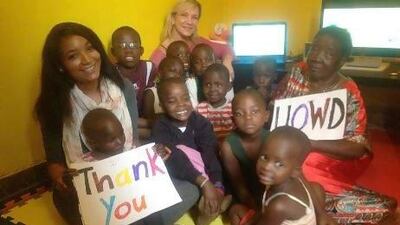DUBAI // A team of university students from the UAE has designed, developed and delivered a software program to teach English as a second language to children in Uganda.
The Early Years Application (EYA) uses artificial intelligence to create interactive learning exercises that can adapt to the learning level of the child.
It was developed by a group of information systems students at the University of Wollongong in Dubai, in collaboration with an Early Years teacher at Deira International School.
Keerthi Prasad, SM Rahman and Redwan Hasan developed the EYA program as part of their final-year studies at the university, with the mentorship of Prof Catherine Todd.
The application won the People's Choice Award at the seventh annual Software Development Trade Show held at the university in June.
"We had a lot of options to choose from when we were picking out our project," Mr Rahman said. "We looked at options from a logistics application for shipping companies, to solving world hunger."
Ms Prasad said: "We set out to address one of the United Nations Millennium Development Goals - universal primary education, because in a multicultural society such as Dubai, English language skills can provide a vital means of communication for children from many nationalities.
"We never imagined the project would be so successful and the software would travel so far, and we are very happy that our work has gone on to make such a difference to the lives of these young children."
The Ugandan children involved in the project are poor orphans.
"At first we just wanted to get it done and get a good grade," said Mr Rahman. "But once we met the students and what they were using and how they were learning, it really pushed us.
"We knew we would be able to help them. And Prof Todd kept telling us that this project has the potential to change lives.
"Having the support and input of a professional in the field was a huge advantage.
"We had no idea how tough this was going to be. There were many factors that we had no concept of, like the algorithm that would identify handwriting."
Many times throughout the year-long project the team felt frustrated and defeated by the sheer difficulty and scope of the project.
"Every time we felt down and about to give up, Prof Todd was there to guide us and motivate us to keep going," Ms Prasad said.
She said the app was based on the British curriculum.
"When we first presented our prototype to the students at Deira and they began using the touchscreen, we saw their eyes light up and they were really engaging with the program," Mr Rahman said.
"That is when we knew it was working. It is a moment I will not forget."
The EYA program is the first undergraduate project from the UAE to be used to help disadvantaged children in sub-Saharan Africa, and it will continue to be used as a teaching aid.
"I'm not surprised at all with what they've achieved," Prof Todd said. "They are very hard-working and their hard work shows in the final product."
The software went through a rigorous testing phase by the university on the Deira International students before being installed in an orphanage in Uganda.
There it allowed underprivileged children to interact with technology in ways they would never normally experience.
The university also donated a laptop and touchscreen to the Home for Rescued Children in Uganda.
"When we first started the EYA program and turned on the writing module, in which a student can write a letter or word on the screen with their finger, the children squealed with absolute delight," Prof Todd said.
"One of the children, Paul, is deaf and was severely burnt as a younger child. We could not take him away from the computer.
"He was just fascinated with it and wanted to learn, like all of the children that tried the software program and used the laptop we donated."
Prof Todd said she was not sure of whom she was more proud - her students for creating the program or Paul for learning to use it.
"The impact that this software and the computer room as a whole will have on life for these Ugandan children cannot be understated," said Anouchka Lucas-Carter, a volunteer at the orphanage.
"It will help to change their lives for the better."
The software is the intellectual property of the university and Deira International.
Prof Todd said the next batch of students would work to improve on the program and make it more flexible.
"We want to have the product out there to be used by people," she said.
"We also want to collect statistics and research data to look at how the software is helping different children."
The software is designed for touchscreens.
It has not yet been developed for tablets because of problems with licensing, but the team hopes that will be the next step.
Prof Todd said the focus was on English as a foreign language, but the program would be ideal for other languages.
@ For more on UAE GIVING, visit thenational.ae/topics

